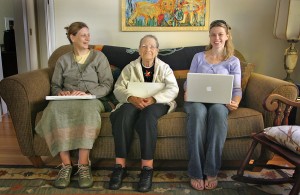
Last week, Tom and I, along with about a hundred other InterVarsity Graduate and Faculty Ministry staff, traveled to Techny Towers Bookstores and Conference Center for our annual staff meetings and training. For the past several years, our GFM team has been journeying through the Four Core Commitments of GFM, with teachers like Scot McKnight, Gordon Smith, and Andy Crouch. As I mentioned on Friday, our teacher this year was MaryKate Morse, George Fox professor and recent author of Making Room for Leadership. Our theme: Serving across Generations on Campus Together.
As part of our training, we participated in intentional listening to colleagues from other generations – uninterrupted time for each other to express our thoughts and feelings about our own generation and others.
One sign of the times: during our worship, I had the good fortune to sit near a couple of older staff who sung hymns in four-part harmony, a magnificent part of our Western church heritage that is rapidly being lost. As I tried to take a note about this later on my iPhone, the spellcheck didn’t recognize the word “harmony.”
It was also so affirming to hear colleagues in their fifties and sixties saying good things about my generation (I’m in my thirties). Sadly, it seems like so much Christian discussion of younger generations focuses soley on the negative —as if every generation did not have its own strengths and weaknesses.
This morning at church (I’m writing on Sunday evening), it occurred to me that Emerging Scholars members also serve on campus across generations. This time of year, especially, I expect that many ESN members are very conscious of younger and older generations – older faculty who may have power over you, younger students whom you may have power over, as well as colleagues with whom you learn through a “pedagogy of collegiality” (a term I just learned and very much like).
Meanwhile, my church (like many others) encourages adult education and discipleship to take place in age-segregated classes. This makes it a bit difficult to practice cross-generational relationships like those described in Titus 2. I have friendly relationships with many older and younger members of my church, but nothing like the “cross-pollination” that Paul assumes (or hopes?) will take place.
What are your strengths and struggles in relating to other generations? What do you think your generation does well? Poorly? How do you see generational dynamics playing out at your university?
Photo credit: 3 Generations, 1 MacBook by lyzadanger
The former Associate Director for the Emerging Scholars Network, Micheal lives in Cincinnati with his wife and three children and works as a web manager for a national storage and organization company. He writes about work, vocation, and finding meaning in what you do at No Small Actors.

Leave a Reply